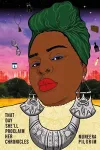
That day she'll proclaim her chronicles
Muneera Pilgrim - Paperback
£9.99
Muneera Pilgrim is an international Poet, Cultural Producer, Writer, Broadcaster, and TEDx speaker, She co-founded the Muslim Hip-Hop and spoken word duo Poetic Pilgrimage, and she is a co-founder of a new platform, Black Muslim Women Bike. She conducts workshops, shares art, lectures, and finds alternative ways to tell stories, build community and exchange ideas. She regularly contributes to BBC 2's Pause for Thought, she is also a community artist researcher, a mental health worker and an alumni associate artist with The English Touring Theatre where she is working on her first play. She developed and delivered the educational and engagement strand of the Othello Project which accompanied the Richard Twyman's version of Othello, and has since gone on to develop a number of other programmes, for The Poetry Cafe, Green Belt Festival, In Between Time and many more As a freelance writer she has written for The Guardian, Amaliah, Huffington Post, The Independent, Al Jazeera Blog, Black Ballard and various other digital and print platforms as well as written chapters for Muslim Review and Mirrior on the Veil. She has been featured across the BBC network including BBC News, Sky News, Sky Arts, Al Jazeera, and various other television channels. In 2015 a documentary was commissioned and screened about Poetic Pilgrimage Called 'Hip Hop Hijabis which has since gone on to win awards. Muneera holds an MA in Islamic studies where she focused on Black British pathways to spirituality, migration, gender and race. She holds a second MA in Women's Studies, where she focused on the intersection of faith and spirituality, race, gender, autoethnography and methodologies of empowerment for non-centred people. Her innovation in her work and use of poetry won her The Ann Kaloski-Naylor Award for Adventurous Academic Writing. She is concerned with telling alternative stories and amplifying unheard narratives. She colourfully etches a poetic space of dialogue which is accessible to all. Rooted in spirituality and following the traditions of many women before her, she use communication and art for edification and social change.